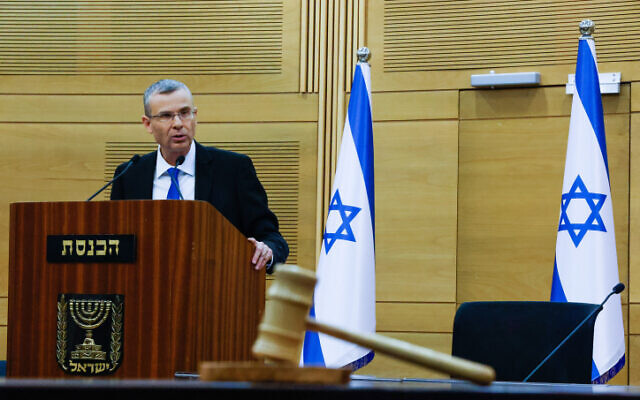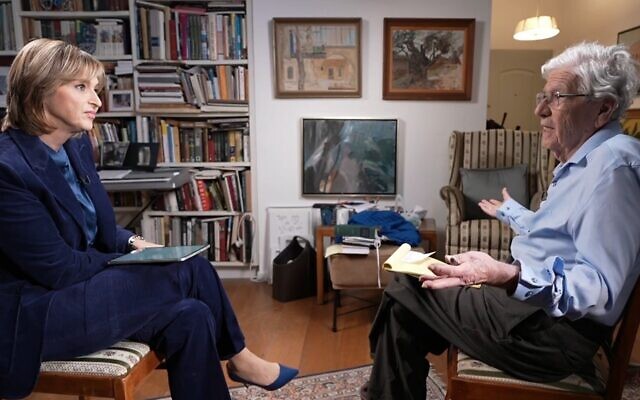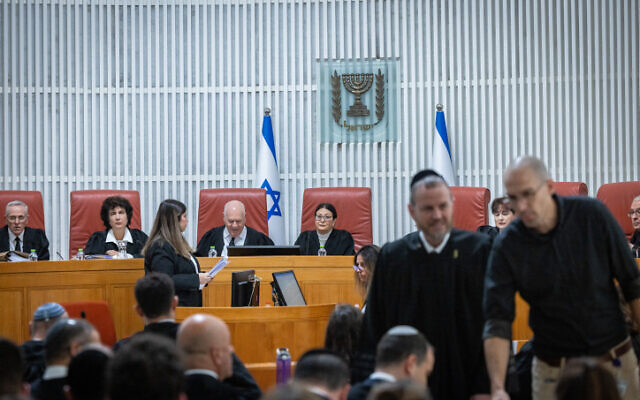In three extensive television interviews broadcast Saturday, Israel’s most revered jurist, the former Supreme Court president Aharon Barak, pleaded with Justice Minister Yariv Levin to reconsider the sweeping judicial reforms he unveiled this week, warning that they essentially give all power to the prime minister, leave citizens with no defense against the removal of any and all of their rights, and would mark the beginning of the end of the modern State of Israel.
Barak has been repeatedly targeted by Levin as the instigator of decades of untenable intervention by Israel’s top court, which the minister says has relentlessly overruled the country’s elected politicians via an outrageous abuse of its authority, thus necessitating the new proposals to radically reduce its power.
In the most anguished passage of the impassioned series of interviews, Barak, 86, said he was sorry to be depicted as “the enemy of the people.” As a justice from 1978-2006, and Supreme Court president in the last 11 of those years, Barak said that he sought to be neither overly activist nor overly conservative and to deliver verdicts that took heed of Israel’s history, Zionism and the country’s security needs.
“If putting me to death would put an end to this drastic shake-up,” he said, “I’d be prepared to go before a firing squad.”
Speaking separately to Channels 12 and 13 and the Kan public broadcaster, Barak said he needed to be sure he was doing everything he could to alert the public to the dangers posed by the coalition’s judicial overhaul plans. Paraphrasing Martin Niemoller, he said, Israelis must not be like the man who “when they told him they’re killing the communists, says I don’t care, I’m not a communist. And then when they’re killing the liberals, he says, I don’t care, I’m not a liberal. And then ultimately, when he says, they’re killing my family, there’ll be nobody to turn to. That is what is likely to happen.”
He called Levin’s proposals “a string of poison pills” that, if put around Israel’s neck, would mark “the beginning of the end of the Third House” — the third period of Jewish national sovereignty, after the ancient First and Second Temple eras.
Barak’s three TV interviews were followed in each case by interviews with Levin, who expressed “respect” for Barak, but claimed the retired court president “does not understand the essence of democracy,” and dismissed as “time-wasting” the notion of establishing a committee with Barak to try to work toward a compromise on his proposals.

Justice Minister Yariv Levin holds a press conference unveiling his plans to overhaul Israel’s judicial system, at the Knesset on January 4, 2023. (Olivier Fitoussi/Flash90)
Levin said that while his plans would be patiently discussed in a key Knesset committee and in the plenum, he hoped the final legislation would be “as close as possible” to the proposals he set out.
Barak’s path, said Levin, “fundamentally contradicted democracy.” As things stand, “all power rests with the judges, and they decide what’s proportionate and reasonable. That’s not democratic.”
A close ally of newly returned Prime Minister Benjamin Netanyahu, Levin on Wednesday presented a planned judicial overhaul that would drastically limit the authority of the High Court of Justice to block legislation and government decisions deemed discriminatory and/or undemocratic, abolish “reasonableness” as a test by which justices can weigh legality, give the government control over judicial selection, and eliminate ministry legal advisers appointed by the attorney general.
Levin said his proposals, which the new government has vowed to rapidly pass into legislation, would restore democracy and strengthen the court.
The constitutional equivalent ‘of a coup with tanks’
The retired chief of justice, a world-respected jurist, said he felt an obligation to warn the public that “the rights of everybody — Jew, Arab, ultra-Orthodox, not ultra-Orthodox — are in grave danger.” If Levin’s proposals are fully implemented, “nobody will protect them” from the political majority of the day, since the Knesset is powerless to resist a majority coalition, and Israel has no constitution, no Bill of Rights, and no second House.
“Your right to dignity, to freedom, to life,” he told Israelis, “will be gravely harmed — and there will no court to turn to.”
Levin, said Barak, “has assembled all the bad proposals… into a chain that is strangling Israeli democracy.” They provide for the “cancellation of judicial oversight” — what he called the constitutional equivalent “of a coup with tanks.”
He likened Levin’s proposals to “fertilizer, that will lead to the growth of tyranny by the majority.” The High Court will be “destroyed” as a brake on the excesses of government, and Israel will turn into a “hollow democracy” like Turkey, Poland and Hungary, he specified. “We’ll be on the edge of the abyss, taking one more step,” he warned.

Former Supreme Court president Aharon Barak in a January 7, 2023 TV interview with Channel 12’s Dana Weiss (Channel 12 screenshot)
Israeli democracy, he said, faced “a clear and present danger… There’ll only be one branch of governance: the prime minister. Because the court will cease to carry out the normal functions that it carries out in a democratic society.”
He also highlighted what he predicted would be devastating international consequences for Israel. The High Court has acted as a kind of legal “Iron Dome,” he said. Without a credible independent court, deemed as ensuring Israel’s democratic functioning, including in its treatment of the Palestinians, “our chief of staff and government ministers will immediately be arrested when they travel overseas… The leaders of the country will be put on trial in the International Criminal Court in The Hague.”
If he were still a justice, he said, “I’d resign from the court” if these proposals became law. “There would no purpose in me being there if all I am doing is the prime minister’s will, that of the government, that of the Knesset. I’d have no existence as an independent authority.”
TV commentators noted that a mass resignation would simply enable the Netanyahu-led government to stack the court with justices regarded as ideologically convenient, in a process that would be eased by Levin’s proposal to remake the selection committee for judges in order to give the government a majority.
Barak, who said he had never met or spoken with Levin but would be pleased to do so to try to help reach compromise proposals, also urged other government ministers and MKs to oppose Levin’s plan and for the public to resist by all legal means. As the interviews were being broadcast, several thousand Israelis gathered at a protest against the new government, which took office on December 29, 2022.

Israelis attend a protest against Prime Minister Benjamin Netanyahu’s new government, at Habima Square in Tel Aviv, on January 7, 2023. (Avshalom Sassoni/Flash90)
Noting that Levin had unveiled his proposals the night before the High Court debated petitions against the return to ministerial office of Shas leader Aryeh Deri, a criminal recidivist who was convicted of tax offenses last year, Barak called the timing “scandalous… like putting a loaded gun on the table.” Levin, he said, seemed to be signaling to the court, “You are preparing to utilize the clause of ‘reasonableness’; know that I’m going to cancel it.”
He said he thought the timing of the move was “probably illegal,” although he noted Levin was protected by his Knesset immunity. He said he was certain the justices would not be influenced by the implied threat.
Canceling the legal concept of “reasonableness” as Levin proposes, Barak said, was “a teaspoon of death” for the Israeli legal system. “‘Reasonableness’ is taught in the law schools, where [Levin] studied. I didn’t invent the concept of reasonableness.”
Levin, in response, insisted the proposals were not timed to impact the Deri deliberations, or any other individual or case.

President of the Supreme Court Esther Hayut (center) and colleagues hold a hearing on petitions demanding they block the return of Shas leader Aryeh Deri as a minister due to his recent conviction and suspended sentence for tax offenses, at the High Court in Jerusalem, January 5, 2023. (Yonatan Sindel/Flash90)
Barak said he favored judicial reform, and that Israel needs a “Basic Law” dealing with legislation. Within the framework of such a law, he said, he supported in principle a provision for the Knesset to re-legislate laws struck down by the High Court. Levin’s proposal says 61 of the 120 MKs will be able to re-legislate a law blocked by the High Court. Barak said he’d be “delighted” were 90 MKs’ votes needed, and that a careful discussion could yield a number “somewhere in between.”
Levin’s override clause requiring the support of just 61 MKs to cancel legislation “would mean there is no judicial oversight… It would mean that a court ruling that protects citizens can be canceled by the same majority that passed it in the first place. What then would remain of human rights?”
Pressed repeatedly on why the court should have the power to override legislation passed by the electorate’s chosen legislators, an objection constantly raised by Levin to explain the imperative for reform, Barak said: “If the Knesset legislates a discriminatory, racist law… then you need to have someone with the power to say that you, the Knesset, have passed a racist law that contradicts the [principles of] the Declaration of Independence, which says there will not be racism, and that contradicts Basic Law: Human Liberty and Dignity, which says we protect the rights of every individual.”
Addressing critics who have called the High Court “an activist on steroids,” Barak said it “acts with great caution. It has canceled 22 clauses in laws since 1992. Is that activism? Is that steroids?”
“The court did not carry out a judicial revolution,” Barak stressed. “The Basic Law: Human Liberty and Dignity and the Basic Law: Freedom of Occupation constituted the judicial revolution,” he said. “Everybody knows that.” And those who claim otherwise “are bold-faced liars.” They seek to misrepresent the High Court “as responsible for the terrible things they claim they want to fight. But the court caused none of these terrrible things.”
Taking aim at the new coalition, he added, “Everyone watching us knows that if there is no oversight on religion and state, the outcome would be that religion and state is a black hole where the Knesset can do what it wants. And it will do what the biggest extremists want. We can see that the biggest extremists are dictating the government’s policy. That’s what will be. Is that democracy? Not in my view.”

Prime Minister Benjamin Netanyahu and Supreme Court president Aharon Barak at a September 1998 Supreme Court ceremony marking 50 years of the Israeli court system (GPO via Wikipedia)
The Netanyahu trial connection
Asked whether he thought the new government was moving toward legislation that would put an end to Netanyahu’s trial on corruption charges, and this judicial overhaul was a first stage in that process, Barak said he saw no way that Netanyahu’s trial could or would be stopped, unless there was “a legal revolution with [the equivalent] of a D-9 or tanks.”
Nonetheless, he said, he had tried to help negotiate a plea bargain in the Netanyahu trial, after he was approached to do so by two of Netanyahu’s lawyers, in an aborted process that made headlines a year ago. Under the draft terms, the sole count of bribery would be dropped, the charge of fraud and breach of trust might be dropped in one of the three cases, Barak said, and it would be up to the court to decide whether the terms of the final conviction constituted “moral turpitude,” for which politicians are required to withdraw from public life for several years.
He said he did not recall what had been decided as regards the state seeking a jail term under such a deal.
“I think the basis of the plea bargain was that Netanyahu would leave public life,” he said. The sides were very close to an agreement, but “the prime minister got cold feet… It’s a shame. A tragedy.”
“If we had reached a plea bargain, there would have been no Yariv Levin proposal,” said Barak, adding that he would still back a plea bargain today, “as the only path to heal the rifts among the [divided] Israeli public.”
A statement issued on Netanyahu’s behalf after the interviews were broadcast said Netanyahu “never agreed to admit to fraud and breach of trust” in any of the cases against him. “If he had agreed, a plea bargain would have long since been struck and the trial would be over.”
Barak described Netanyahu as “a very complex man,” currently battling between his sense that he has been utterly unfairly targeted with his criminal prosecution, and his concern for his legacy. It was “true,” he said, that Netanyahu was once a great defender of the High Court’s independence. Now, the prime minister has apparently given more weight to the “personal problem” of the trial by empowering Levin, said Barak.
“I’m not saying he’s doing all this to get out of his trial,” he said. “I’d be happy to speak to Netanyahu… if it would be helpful. I haven’t spoken to him for years.”
Said Barak: “We used to be friendly. Very friendly, even. So I have no problem talking to him, or his wife, and with whoever needs to talk.”
When it was put to Barak that while judges are not elected by the public, the electorate voted for this right, far-right and ultra-Orthodox government, giving its members 64 seats in the Knesset, Barak noted that if the left-wing Meretz party had cleared the Knesset threshold and won four seats, as it narrowly failed to do, “everything would have been different.”
Would that have suddenly meant the people did not want this legal revolution, he asked rhetorically. “We have a divided people, 50-50.” And with those divisions, major changes such as to the separation of powers need “the widest possible agreement.”
Levin: Court will still retain ‘extreme’ power to intervene
In his three interviews responding to Barak, Levin rebuffed the invitation to consult and negotiate, asking, “Where was he all those years whereby, without authority and consideration, with a series of verdicts, he crushed entire swathes of people, took away rights, destroyed democracy?”
“Did he consult with anyone, ask anyone, pay heed to anybody?”
The justice minister promised his proposals would be discussed at length in the plenum and in the Knesset Constitution Law and Justice Committee, even though it was put to him that this committee’s chairman, Simcha Rothman of the Religious Zionism party, had indicated that the proposals are to be rapidly advanced.
He also invited National Unity Party head Benny Gantz, who has called for negotiations on compromise proposals, to come to the committee and set out his positions.
“All views will be heard” in the committee and in the Knesset, he said, though he added: “I hope the final result will be close to what I presented because I think that’s the right thing to do.”
Levin was adamant that the High Court would retain considerable power — indeed, he said, it would still be “at the extreme end” of the spectrum when compared to courts’ powers of intervention in other democracies.
If a decision is made or a law is passed “that discriminates, that is illegal, that did not follow the correct procedure,” the courts would still have the power to strike it down, he said. “The court will intervene and correct it,” he said. “Such decisions clearly will be struck down.”
Rather, he said, he was seeking to put an end to “an insane situation in which a decision is made legally that is not discriminatory, that is a matter of policy,… and the judges say, you were elected, but we’ll choose for you… This is not democracy.”
He also rejected the notion that there are only two real branches of government in Israel — the cabinet and the courts, because the Knesset cannot resist a like-minded coalition majority. “The Knesset is not a rubber stamp for the government,” he said.
He denied that he had timed unveiling the proposals for the eve of the Deri hearing, and also denied that, were the courts to cancel Deri’s appointment as minister of interior and health on the grounds of “unreasonableness,” this would lead to the expedited passage of legislation canceling that legal concept for judges. “That will not be a catalyst,” he said.
He also denied his proposals had anything to do with the Netanyahu trial. Netanyahu did not give him a carte blanche with his proposals, he said. But “Netanyahu knew my views. He didn’t need a great deal of imagination to know where I was heading.”
He also denied that his planned reconstitution of the judicial selection committee would mean the government could fire judges at will, including those in the Netanyahu trial. The government of the day would not have enough votes on the committee to do so, he said, although his proposals as presented to date appear to allow for the possibility.
Levin objected to Barak’s mentions of tanks, guns to the head, and firing squads, saying it was “very grave” that those kinds of views circulated in the High Court.
“My reform is not coming to the Knesset on tanks,” said the justice minister. “It is coming to the Knesset on the ballot slips of the voters in a democratic election, with the support of vast parts of the public.
“I’m not changing all the rules of the democratic game. I’m restoring democracy and incidentally strengthening the Supreme Court.”
Asked what would stop the governing majority from canceling all future national elections, Levin said, “the High Court will cancel [any such] law.”
Pressed that, under his plans, the government will have appointed the justices and they will do the government’s bidding, he said, “That’s not the case. [The justices] don’t all get changed on the same day. If my reform had been implemented 10 years ago, we’d have a diverse, pluralistic court.”
Amid reports that the coalition intends to push through his sweeping reforms within weeks, Levin refused to specify a timeline, but promised, “We’ll advance with patience.”
“There is vast support for this reform,” he said. “I am determined to institute it.”
“I understand the concerns,” said Levin. “We’ll do it wisely.. and Israel will ultimately be more democratic.”
"Stop" - Google News
January 08, 2023 at 07:03AM
https://ift.tt/FmlnIxO
Ex-top judge Barak: ‘Put me before a firing squad’ if it’ll stop move to tyranny - The Times of Israel
"Stop" - Google News
https://ift.tt/ypKJzse
https://ift.tt/VD2CvQY
Bagikan Berita Ini















0 Response to "Ex-top judge Barak: ‘Put me before a firing squad’ if it’ll stop move to tyranny - The Times of Israel"
Post a Comment